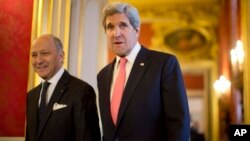PARIS —
Meeting with business leaders in Paris, U.S. Secretary of State John Kerry discussed challenges emerging economies present to more industrialized nations. The Obama administration is negotiating a Transatlantic Trade and Investment Partnership with the European Union.
Together, the United States and European Union are the world's-largest economic entity, a position Secretary Kerry says is under threat.
"We both have mature economies and we are operating in a new world of voracious appetites in the marketplace with people playing by different rules and some playing by no rules at all," he said.
According to Kerry, that presents corporate leaders with enormous challenges.
"They range from countries that are near failing, for reasons that we should talk about, to failed states to old orders that are under siege from people who have a different vision," he explained, "but where that vision is sometimes being captured by cultural and religious and extreme and other forms of governance, which complicate the marketplace."
Kerry added that in that vastly changing economic landscape, emerging economies find dangerous advantages.
"As the Indias and Chinas and Brazils and South Koreas and Mexicos and others come on line economically, playing to the advantages of a lack of environmental rules or a lack of standards in the production of goods or a lack of labor standards and other things that are part of what civilized and developed communities have created for themselves, that as you see them come online obviously the competition for whatever widget it is you produce or sell is much more intense," Kerry said.
That means many businesses go where they can produce goods at the least cost with the least interference, undercutting more-established trade.
"How do we get over an old way of looking at this so that we are not all engaged in a race to the bottom, that we are not looking for the lowest common denominator of how you do business, but we are perhaps influencing other people to rise to the highest common denominator?" Kerry asked.
He says President Obama's push for a Transatlantic Trade and Investment Partnership with the European Union is part of getting the economic "rules of the road" right.
"This trade agreement, if we move rapidly, can have a profound impact on the rest of the world," Kerry noted.
The trade deal seeks to strengthen market-based disciplines for state-owned enterprises and promote the global competitiveness of small- and medium-sized businesses by reducing non-tariff barriers that impede the flow of goods and services. It is designed to cut the cost of differences in regulation and standards by promoting greater compatibility, transparency, and cooperation.
Secretary Kerry's stop in Paris included talks with French Foreign Minister Laurent Fabius on the war in Syria, the fight against extremists in Mali and the rebel-takeover in the Central African Republic.
It follows meetings in Kabul with Afghan President Hamid Karzai and talks in Baghdad with Prime Minister Nouri al-Maliki. Secretary Kerry also followed-up on President Obama's trip to the Middle East in separate meetings with Israeli Prime Minister Benjamin Netanyahu and Palestinian President Mahmoud Abbas.
Together, the United States and European Union are the world's-largest economic entity, a position Secretary Kerry says is under threat.
"We both have mature economies and we are operating in a new world of voracious appetites in the marketplace with people playing by different rules and some playing by no rules at all," he said.
According to Kerry, that presents corporate leaders with enormous challenges.
"They range from countries that are near failing, for reasons that we should talk about, to failed states to old orders that are under siege from people who have a different vision," he explained, "but where that vision is sometimes being captured by cultural and religious and extreme and other forms of governance, which complicate the marketplace."
Kerry added that in that vastly changing economic landscape, emerging economies find dangerous advantages.
"As the Indias and Chinas and Brazils and South Koreas and Mexicos and others come on line economically, playing to the advantages of a lack of environmental rules or a lack of standards in the production of goods or a lack of labor standards and other things that are part of what civilized and developed communities have created for themselves, that as you see them come online obviously the competition for whatever widget it is you produce or sell is much more intense," Kerry said.
That means many businesses go where they can produce goods at the least cost with the least interference, undercutting more-established trade.
"How do we get over an old way of looking at this so that we are not all engaged in a race to the bottom, that we are not looking for the lowest common denominator of how you do business, but we are perhaps influencing other people to rise to the highest common denominator?" Kerry asked.
He says President Obama's push for a Transatlantic Trade and Investment Partnership with the European Union is part of getting the economic "rules of the road" right.
"This trade agreement, if we move rapidly, can have a profound impact on the rest of the world," Kerry noted.
The trade deal seeks to strengthen market-based disciplines for state-owned enterprises and promote the global competitiveness of small- and medium-sized businesses by reducing non-tariff barriers that impede the flow of goods and services. It is designed to cut the cost of differences in regulation and standards by promoting greater compatibility, transparency, and cooperation.
Secretary Kerry's stop in Paris included talks with French Foreign Minister Laurent Fabius on the war in Syria, the fight against extremists in Mali and the rebel-takeover in the Central African Republic.
It follows meetings in Kabul with Afghan President Hamid Karzai and talks in Baghdad with Prime Minister Nouri al-Maliki. Secretary Kerry also followed-up on President Obama's trip to the Middle East in separate meetings with Israeli Prime Minister Benjamin Netanyahu and Palestinian President Mahmoud Abbas.











